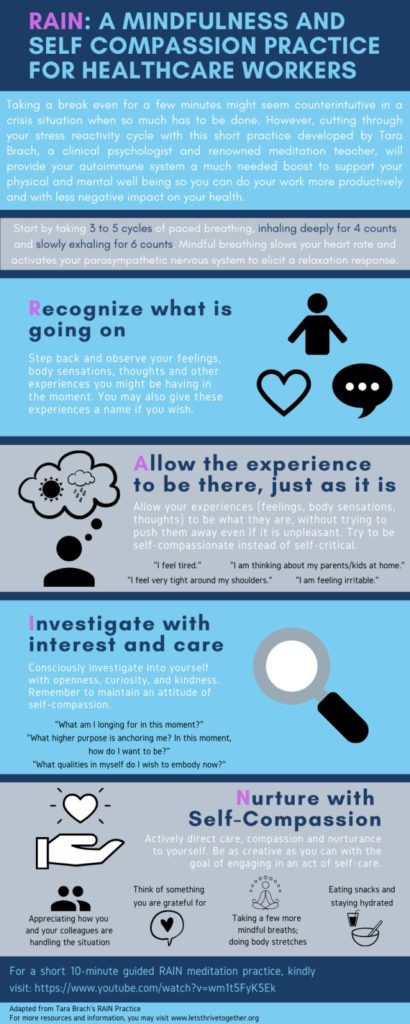By Joanna Herrera PsyD, RPsy, Executive Director
- Recognize what is going on;
- Allow the experience to be there, just as it is
- Investigate with interest and care;
- Nurture with self-compassion.
We know that this world crisis has thrust upon YOU our healthcare workers—physicians, nurses, medical technicians and other medical personnel, such great responsibility and immense work to treat and protect our communities. With this heavy load on your shoulders, we realize you would be more susceptible to exhaustion and burn-out, which can compromise your mental and physical immunity as well as decrease your productivity. We want to help you stay well, healthy and resilient, most of all for yourself and your loved ones. And we also realize that, as we yet do not know the extent of how long this crisis will play out, we need to help you sustain these efforts for the longer haul.
We wish to share with you a practice that incorporates mindfulness and self-compassion for burn-out prevention. Mindfulness means paying attention to the present moment, to what is going on within us and outside of us, with curious, kind, and nonjudgmental attention. It is a practice of letting be. Mindfulness has been shown in hundreds of studies to foster wellbeing, healthy immune functioning, and cellular health (refer to resource page for more information and resources). Self-compassion is a practice (Dr. Kristin Neff, www.selfcompassion.org) that involves directing compassion for oneself during a time of suffering. Self-compassion consists of three elements— mindfulness (present-focused awareness), common humanity (the understanding that one’s experience is similar to others, thus potentially reducing one’s sense of alienation), and self-kindness (using kind gestures or phrases toward oneself to support oneself). Self-compassion practices have been shown to improve positive affect, as well as social connection, and self- and other-focused affect, implying that these may serve as potential burnout prevention tools.
The mindfulness and self-compassion practice we are featuring below was developed by clinical psychologist and renowned meditation teacher, Tara Brach (www.tarabrach.com). This practice can be done in as little as 5 to 10 minutes. Stopping or taking a break even for a few minutes might seem counterintuitive in a crisis situation when so much work has to be done. However, cutting through your stress reactivity cycle with this short practice will provide your auto-immune system a much needed boost to support your physical and mental wellbeing so you can do your work more productively and with less negative impact on your health.
The RAIN of Self Compassion
Take a 5-10 minute pause to do the following steps. Start by taking 3 to 5 cycles (or more if you wish) of paced breathing, inhaling deeply for 4 counts and slowly exhaling for 6 counts.Mindful breathing slows your heart rate and activates your parasympathetic nervous system to elicit a relaxation response. RAIN can be done as stand-alone mindfulness meditation practice but you can also move through the steps whenever challenging feelings arise.
R- Recognize what’s going on
Step back and observe what is here for you. Recognize and become aware of your feelings, body sensations, thoughts, and other experiences you might be having in the moment. If you choose, you can put a name to any feelings, thoughts, or sensations.
A- Accept/Allow the experience to be there just as it is
Allow your experiences—feelings, body sensations, thoughts, to be what they are without trying to push them away, even if it is unpleasant. (E.g. “I feel very tight around my shoulders, I feel tired, I am thinking about my parents/kids at home, I am feeling irritable.”) As you are doing this, be self-compassionate instead of self-critical.
I- Investigate with kindness
Consciously investigate into yourself with openness, curiosity, and kindness. Remember to maintain an attitude of self-compassion. (E.g. “This hasn’t been easy, I see that sometimes I’m feeling helpless.) What am I longing for in this moment? What higher purpose is anchoring me? In this moment, how do I want to be? What qualities in myself do I wish to embody right now?
N- Nurture yourself
Actively direct care, compassion, and nurturance to yourself. Perhaps take a moment to think of what you appreciate in the way you or your other colleagues are handling this situation. It could also be calling into mind an experience in the past where you succeeded and made it through a challenging situation. You could also think of something that you feel grateful for. Alternatively, nurturing may be done by taking a few more mindful breaths, taking a short walk, doing yoga stretches, hydrating, or having a snack. Be as creative as you can with the goal of engaging in an act of self-care.
You may access this link for a guided RAIN practice:
